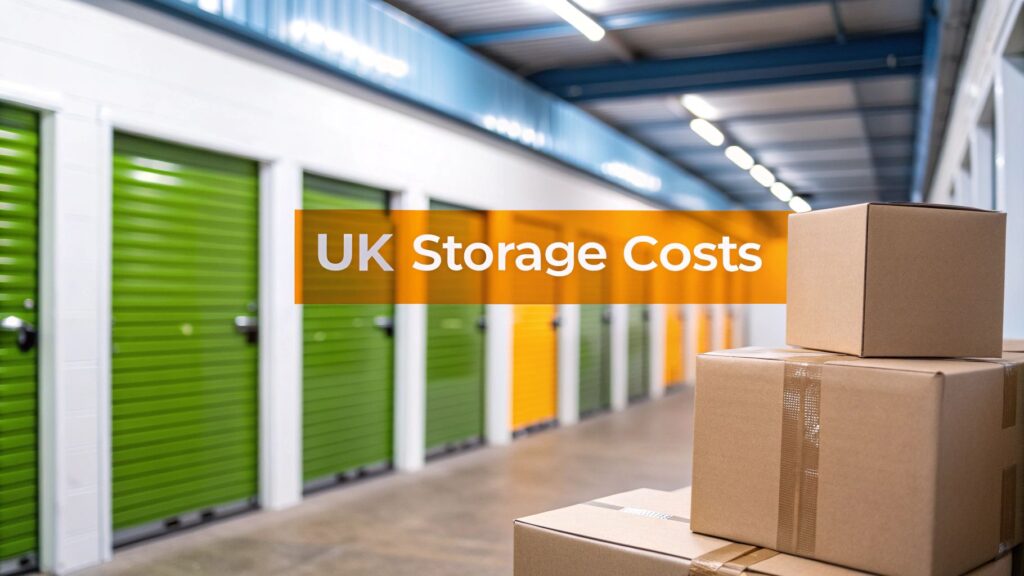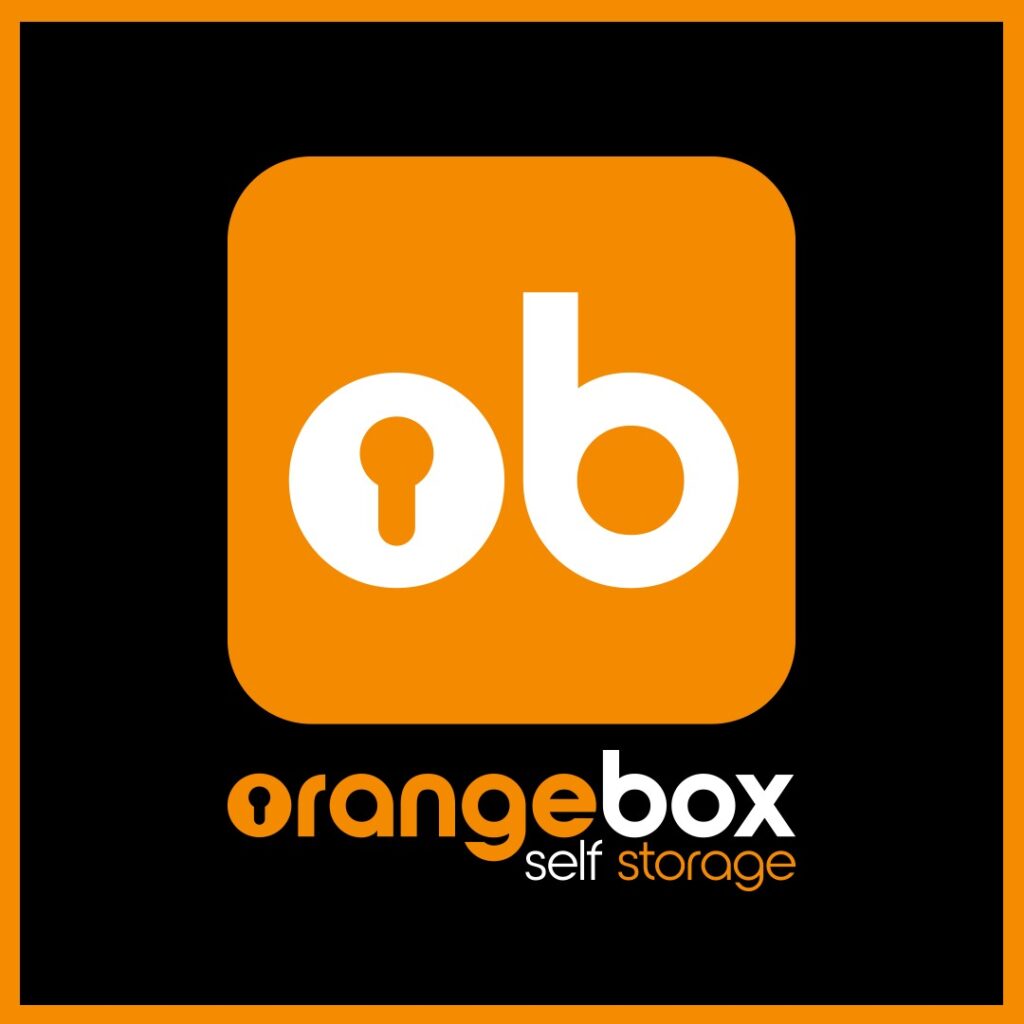On average, you can expect to pay anywhere from £15 to £30 per week for a small-to-medium self-storage unit (around 50 sq ft) here in the UK. But that's just a ballpark figure. Prices are massively influenced by your location, with major cities like London always commanding a premium compared to other spots across the country.
Breaking Down the Average Self Storage Cost UK
So, how much does self storage cost in the UK, really? It helps to think of it like booking a hotel room. The price isn't a simple, fixed number; it flexes based on size, location, and how long you need it for. A small locker just big enough for a few boxes will obviously be far cheaper than a large unit that can swallow the entire contents of a four-bedroom house.
The self-storage industry has become a huge part of the UK economy, generating just under £1.2 billion in turnover in 2024 from over 2,900 sites nationwide. It's not just for people moving house, either. An interesting slice of the pie – 24% of self-storage users, in fact – are businesses. These are often SMEs and tradespeople using their units as a handy mini-warehouse or an operational base. You can get a deeper dive into the industry's growth over on Cleveland Containers.
To give you a clearer picture of what you might pay, let's break down some typical weekly costs.
Average Weekly Self Storage Costs in the UK
This table gives you a quick summary of what you can expect to pay for different unit sizes, depending on whether you're in the capital or elsewhere. It’s a handy way to estimate your potential expenses at a glance.
| Unit Size (sq ft) | Typical Weekly Cost (London) | Typical Weekly Cost (Outside London) | What It Can Hold |
|---|---|---|---|
| 25 sq ft | £25 – £40 | £15 – £25 | The contents of a garden shed or a large car boot |
| 50 sq ft | £40 – £60 | £25 – £40 | Contents of a one-bedroom flat |
| 100 sq ft | £60 – £90 | £40 – £65 | Contents of a two-bedroom house |
| 150 sq ft | £85 – £120 | £60 – £90 | Contents of a three-bedroom house or a family car |
The figures in the table really highlight the "London effect" on pricing. To make it even clearer, this bar chart shows the average monthly cost for a standard 25 sq ft unit in London compared to Manchester and Birmingham.
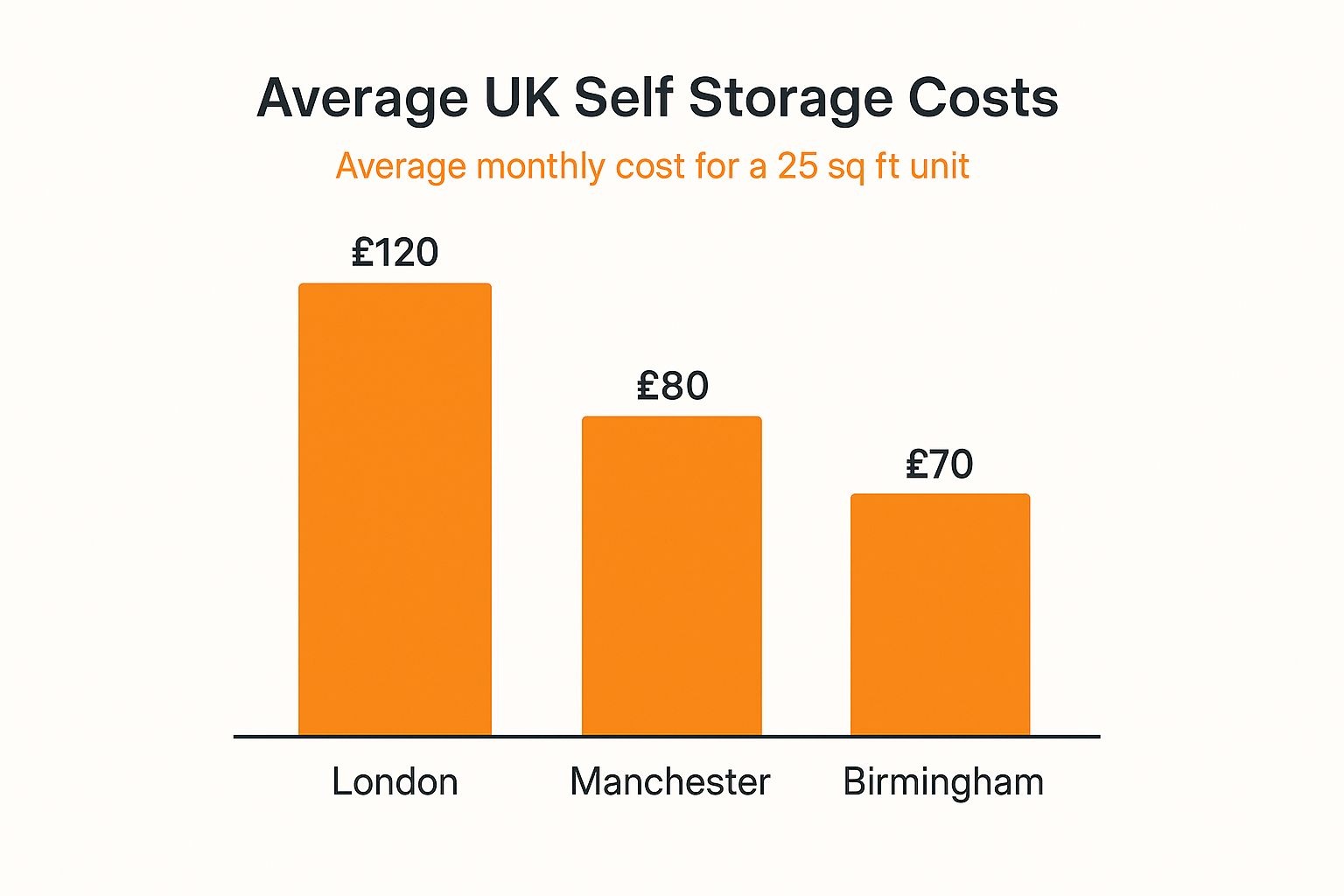
As you can see, London's prices are in a league of their own. It’s a direct reflection of the capital's steep property values and the sheer demand for space. This is the single biggest factor you'll need to budget for if you're looking for storage in or around the city.
What Really Determines Your Storage Price?
Beyond the initial weekly price you see advertised, several key factors are working behind the scenes to determine your final bill. Getting your head around these variables is the best way to get an accurate idea of what self-storage will actually cost you and avoid any nasty surprises down the line.
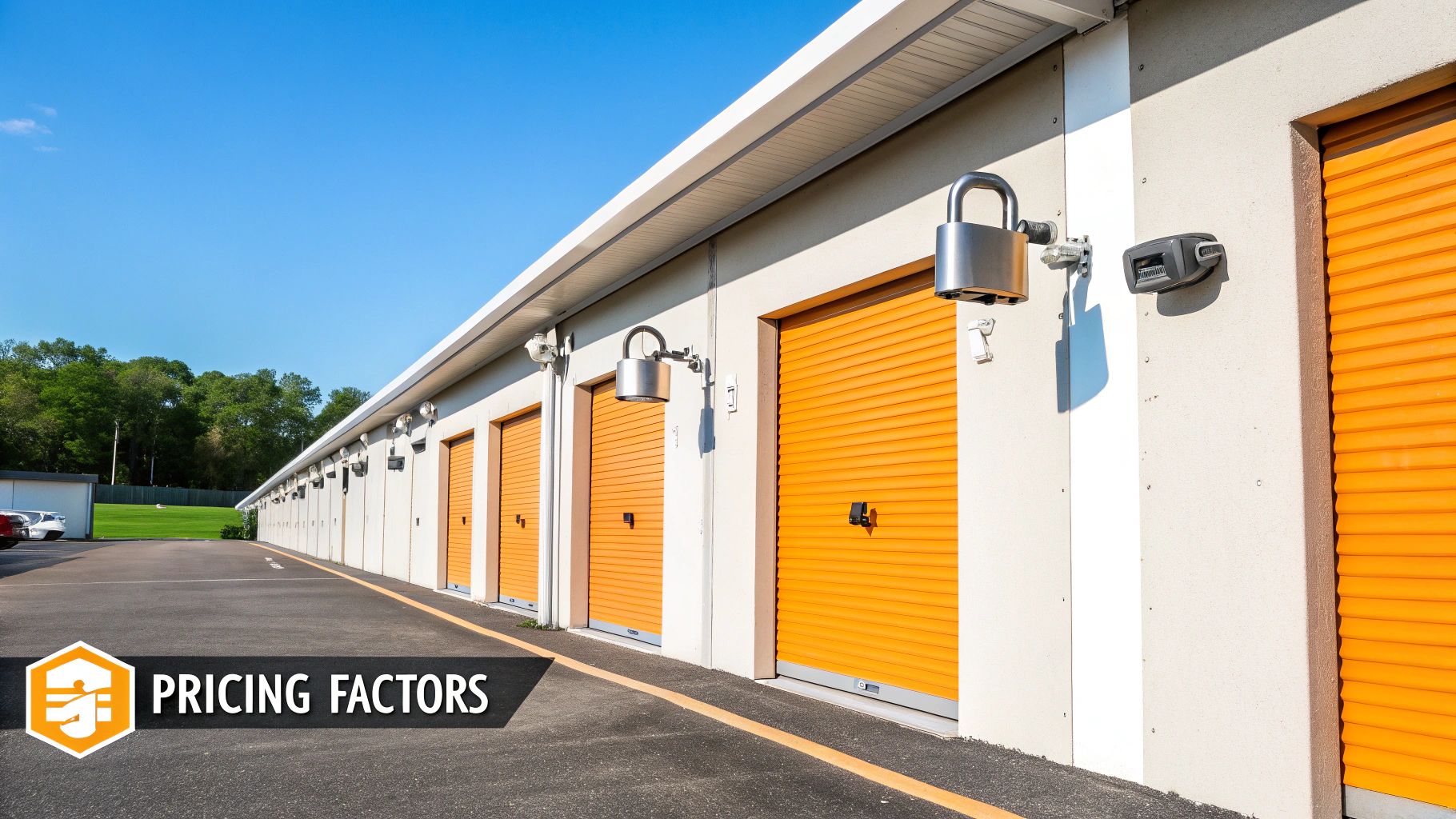
Think of it like booking a flight. The base fare looks tempting, but the final price quickly changes depending on your baggage allowance, whether you choose your seat, and your travel dates. Self-storage works on a pretty similar principle, where your specific needs and choices directly shape the cost.
Your Rental Term and Commitment
One of the biggest things influencing the price is how long you plan to stay. A short-term, flexible monthly contract offers maximum convenience, but you'll often find it comes at a higher weekly rate. On the flip side, committing to a longer period, like six or twelve months, can unlock some hefty discounts.
Facilities reward loyalty. If you know for sure you’ll need storage for a while, it's always worth asking about pre-payment deals or reduced rates for a longer commitment. For a deeper dive, check out our guide on the benefits of long-term storage options.
This pricing strategy makes perfect sense for providers, who much prefer the security of a guaranteed customer for several months. It ends up being a win-win: you save money, and they secure a reliable booking.
Indoor Units vs. Outdoor Containers
The type of unit you choose plays a massive role in the final price. Your two main options are typically indoor units, housed within a larger building, or outdoor drive-up containers.
-
Indoor Units: These are often climate-controlled and located inside a secure building with features like keypad entry and extensive CCTV. They offer far better protection from temperature swings and damp, making them the go-to choice for sensitive items like wooden furniture, electronics, or important documents. All that added security and climate stability means they usually cost a bit more.
-
Outdoor Containers: These are generally the more budget-friendly option. They offer fantastic convenience, letting you drive right up to the door to load and unload bulky items. While they're secure and weatherproof, they don't provide the same stable environment as indoor units, making them better suited for things like garden tools, building materials, or less delicate possessions.
The choice really comes down to balancing cost against the needs of your belongings. If you're storing an antique wooden dresser, paying a little extra for an indoor unit is a worthwhile investment to prevent any damage.
Access Hours and Seasonality
Finally, you'll need to think about when you need to get to your things and the time of year you book. Standard access during office hours is the most common and cost-effective option. However, if you require 24/7 access, many facilities offer this for a premium.
Seasonality also comes into play. Demand for storage often peaks during the summer moving season and around student holidays. The UK self-storage sector is home to roughly 4,546 facilities, and just like any market driven by supply and demand, rates can climb during these busy periods. Booking during quieter months, like late autumn or winter, could land you a much better deal.
Decoding the Hidden Fees in Your Quote
That headline price you see online? Think of it as a starting point. When people first look into how much self-storage costs in the UK, many get a bit of a shock when the final bill rolls in with a few extra charges. Getting your head around these potential add-ons before you commit is the secret to setting a realistic budget and dodging any nasty surprises.
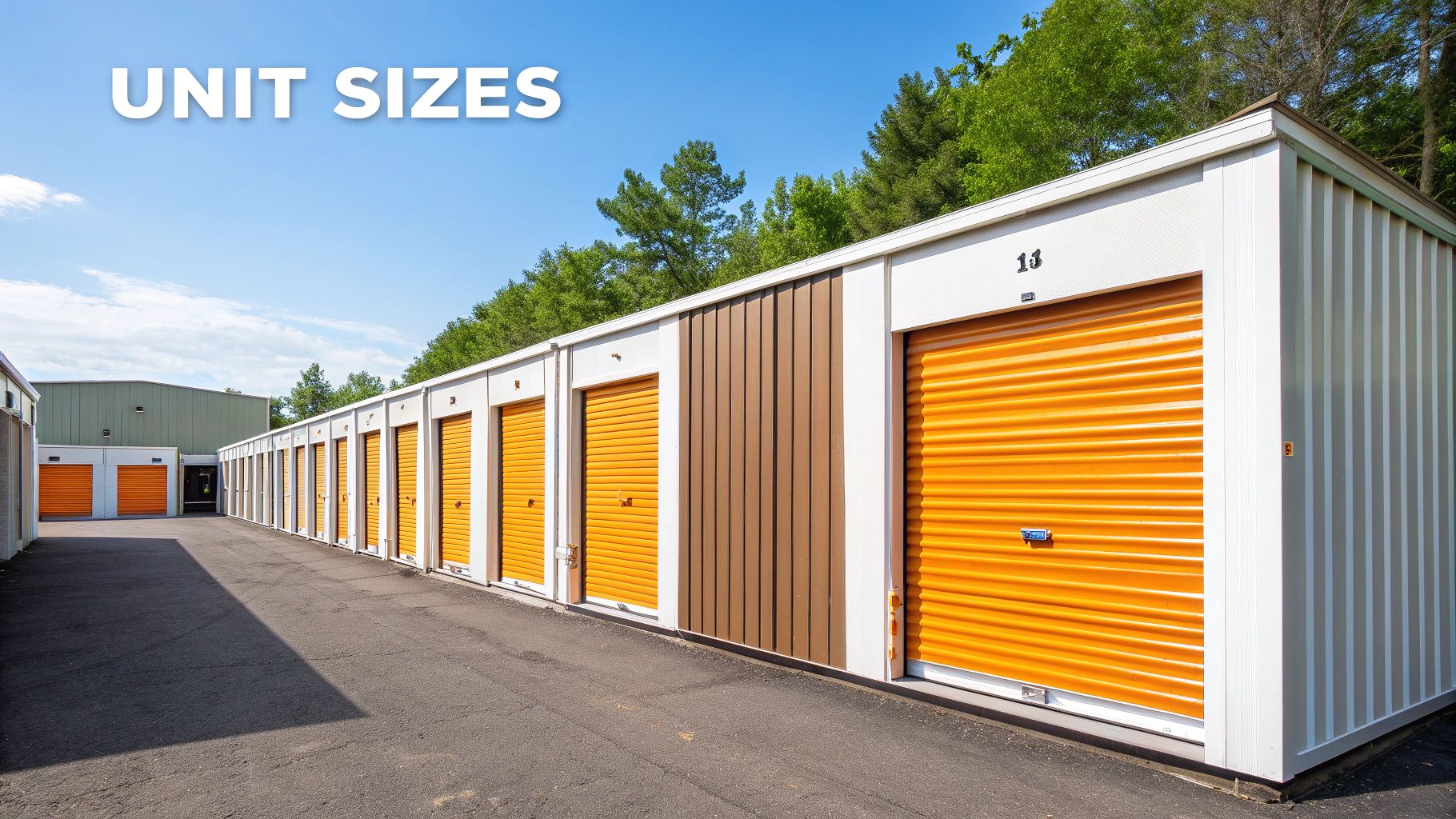
It’s a bit like booking a budget flight. The initial fare looks like a bargain, but once you’ve added your luggage, picked a seat, and paid for the essentials, the total cost tells a different story. Self-storage can work in a similar way, with a few common fees that might not be shouted about in the big print.
Mandatory and One-Off Charges
First up are the non-negotiable costs, usually related to security and protecting your belongings. You’ll need to factor these into your initial setup expenses.
- Mandatory Insurance: Pretty much every reputable facility will insist that you have insurance cover for your stored items. They’ll have their own policy on offer, but you’re not forced to take it. It’s always a good idea to check if your existing home contents insurance covers goods in storage, or shop around with specialist third-party providers. You might find a better deal.
- Padlock Costs: You’ll need a solid padlock to secure your unit, and most places sell them on-site for convenience. This is a one-time cost, but a tough, durable lock is an investment worth making. Some providers might even throw one in with your initial fee, so it never hurts to ask.
- Security Deposit: Lots of companies ask for a refundable security deposit, which is usually the equivalent of two to four weeks’ rent. This just covers them against any potential damage or unpaid rent. As long as you leave the unit clean, empty, and on time, you’ll get this money straight back when you move out.
Before you sign on the dotted line, always ask for a full, itemised breakdown of every single mandatory fee. A trustworthy company will have no problem giving you this, making sure you know the true cost of your self-storage unit from day one.
Optional Extras That Can Add Up
On top of the required fees, facilities often provide a range of extra services and products to make your life easier. They can be genuinely helpful, but these optional bits and pieces can quietly inflate your overall spend if you’re not paying attention.
For instance, you'll likely need packing materials like boxes, bubble wrap, or tape. Grabbing these from the storage facility is handy, but it's often pricier than picking them up from a local supermarket or an online retailer.
Some sites also offer shelving or racking systems for hire. These can be brilliant for keeping your unit organised, but they will add a recurring cost to your monthly bill. It’s always a balancing act—weigh up the convenience against the extra expense before you say yes.
How Your Postcode Impacts Storage Costs
When you’re trying to work out the cost of self-storage, your postcode is one of the biggest factors in the final price. It’s not just a small difference, either. The gap between renting a unit in a busy city centre and a facility in a quieter suburban town can be staggering—you could easily see prices jump by 50% or more for the exact same size unit.

It works just like the property market. Think about it: a one-bedroom flat in central London will set you back a fortune compared to an identical one in a smaller town. Self-storage pricing follows the same logic, driven by local land values, population density, and simple supply and demand.
Facilities in urban centres, particularly in the South East, have to deal with much higher running costs. Everything from rent and business rates to staff wages is more expensive, and those costs are inevitably passed on to you, the customer.
Regional Price Comparison for a 100 sq ft Storage Unit
To really see this in action, let's compare the average monthly price for a standard 100 sq ft storage unit—that's roughly what you'd need for the contents of a two-bedroom house. The table below lays out just how much of a premium you pay for a city-centre postcode.
| Region / City | Average Monthly Cost (100 sq ft) | Percentage Difference from National Average |
|---|---|---|
| Central London | £280 – £350 | +40% to +60% |
| Manchester | £180 – £220 | +5% to +15% |
| Birmingham | £170 – £210 | On par with national average |
| Suburban/Rural Areas | £140 – £170 | -15% to -25% |
As you can see, a short drive out of a major city can save you a serious amount of cash each month. It's why those looking for self storage in Derby, for instance, often find much more competitive deals than they would in bigger, more saturated markets like London or Manchester.
The bottom line is that convenience comes at a price. If you don't need to get to your things every day, looking at facilities just 10-15 miles outside a city centre is one of the smartest money-saving moves you can make.
Why Is There Such a Big Difference?
The huge price gap really just boils down to basic economics. In densely populated urban areas, the demand for storage is sky-high. You’ve got people living in smaller flats with no spare room, businesses needing local places to hold stock, and a constant stream of people moving in and out of the city.
This intense demand has sparked a building boom. By the end of 2024, the UK’s total self-storage space is expected to hit a massive 64.3 million square feet, which is a 7.2% increase in just one year. You can dive into the numbers yourself in this 2025 industry report.
But even with all this new supply, prime locations still command premium prices. It just goes to show that doing a bit of geographical homework is a must for any savvy customer.
Smart Strategies to Lower Your Storage Bill
Knowing the average self-storage cost in the UK is one thing, but actively knocking that price down is where you can make a real difference to your budget. With a few clever tactics, you can easily find a much better deal without having to compromise on quality or security. It’s all about being a savvy consumer and knowing where the savings are hiding.
Plenty of facilities offer fantastic introductory deals, especially when you book online. It’s common to see offers like 50% off your first eight weeks or even the popular ‘first month for £1’ deal. These promotions are designed to get you in the door and can mean huge initial savings.
Declutter Before You Pack
One of the most effective ways to lower your bill is to make sure you’re not paying for space you don’t actually need. Before you even think about getting a quote, have a thorough declutter. Be ruthless with items you haven’t used in years.
Sell, donate, or recycle anything that’s just gathering dust. The less you have to store, the smaller the unit you'll need, which directly translates to a lower weekly cost. Think of it this way: every box you get rid of is money back in your pocket.
Think Outside the Box with Your Booking
A little creative thinking can unlock even more discounts and affordable options. Don't just accept the first quote you're given; it pays to explore these practical alternatives.
- Share the Space: Got a friend or family member who also needs storage? Renting one larger unit and splitting the cost is almost always cheaper than renting two smaller ones.
- Compare Insurance Quotes: While insurance is a must, you're not obligated to buy the facility's in-house policy. First, check if your home contents insurance already covers items in storage. If not, compare quotes from third-party specialist insurers who often provide much better rates.
- Ask About Discounts: Never be afraid to just ask what deals are available. Facilities often have unadvertised discounts for certain groups, and there are often specific offers for those in education. If you want to learn more about this, you can explore the benefits of dedicated student storage.
By taking a proactive approach, you shift from being a passive price-taker to an active deal-hunter. A few phone calls and a bit of planning can easily cut your overall self storage cost by a significant margin, ensuring you get the best possible value.
Finding the Right Storage Solution for You
So, how do you pull all this together and make a decision you feel good about? Figuring out how much self-storage really costs in the UK means looking beyond that tempting weekly rate. You need to see the whole picture, from the unit size and its location to those sneaky extra fees that can catch you out. The goal isn’t just to find the cheapest option, but the one that gives you the best value for what you actually need.
Ultimately, the best storage solution is a careful balance between price and peace of mind. A rock-bottom price isn’t much of a bargain if your belongings aren’t secure or you can’t get to them when you need to. Before you sign on the dotted line, it’s vital to weigh up everything we’ve talked about.
Your Final Checklist Before Signing
To make sure you’ve covered all your bases, here are a few crucial questions to ask yourself—and the storage provider. Think of it as a simple checklist to help you compare different facilities fairly and choose a solution that genuinely fits.
- What is the total monthly cost? Ask for a full breakdown including rent, VAT, mandatory insurance, and any other regular fees. No surprises, please.
- Are there any one-off costs? Get clarity on the price of a padlock and whether they require a refundable security deposit upfront.
- What level of security is provided? You’re looking for 24/7 CCTV, secure perimeter fencing, and controlled gate access as a minimum.
- What are the access hours? Make sure their standard hours work with your schedule. If you need round-the-clock access, find out what the extra cost is.
- What type of unit is best for my items? For anything sensitive like electronics, documents, or wooden furniture, an indoor unit is usually a much safer bet than an outdoor container. You can learn more in our guide on indoor vs container storage.
By arming yourself with this knowledge, you can confidently navigate the options and find a self-storage solution that protects both your belongings and your budget. The right choice offers not just space, but complete reassurance.
Still Have Questions About Storage Costs?
Working out the final price of self-storage can leave you with a few last-minute questions. Getting clear, straightforward answers is the key to budgeting properly and feeling confident in your choice. Let's tackle some of the most common queries we hear.
Is It Cheaper to Rent for a Longer Period?
Yes, in most cases, it absolutely is. Many UK storage facilities will offer you a decent discount for a long-term rental. If you know you'll need the space for a while, committing to a 6 or 12-month contract can bring your average monthly cost down quite a bit compared to a flexible, month-to-month agreement.
It's always worth asking the facility manager about their pre-payment deals or long-term offers before you sign on the dotted line.
Do I Have to Buy the Facility's Insurance?
No, you're not usually forced to buy the facility's own insurance policy. However, having some form of contents insurance is nearly always mandatory.
First, it’s a good idea to check if your existing home contents insurance already covers items held in storage. If it does, you can just provide proof of cover to the facility. If not, you can shop around with third-party providers who specialise in storage insurance. You’ll often find they offer a more competitive rate than the in-house option.
Weighing up your insurance options is a smart move. While the facility's policy is convenient, a few minutes of research could lead to noticeable savings on your overall self-storage cost.
Are Outdoor Containers Cheaper Than Indoor Units?
Generally, yes. Outdoor container storage, which often comes with handy drive-up access, tends to be more affordable than an indoor unit of a similar size. This is mainly because they're simpler to build and can be located on less expensive land.
The trade-off, however, is that they might not offer the climate control or multi-layered security you’d get from an indoor facility, which typically has features like keypad entry and extensive CCTV. It's all about weighing the cost savings against what you're actually storing and what level of protection it needs.
Ready to find a storage solution that fits your budget and your needs? At Orange Box Self Storage, we offer secure, flexible, and affordable options across Nottingham and Derby. Get a free, no-obligation quote online in seconds and see how much you could save. Find your perfect storage unit today.

